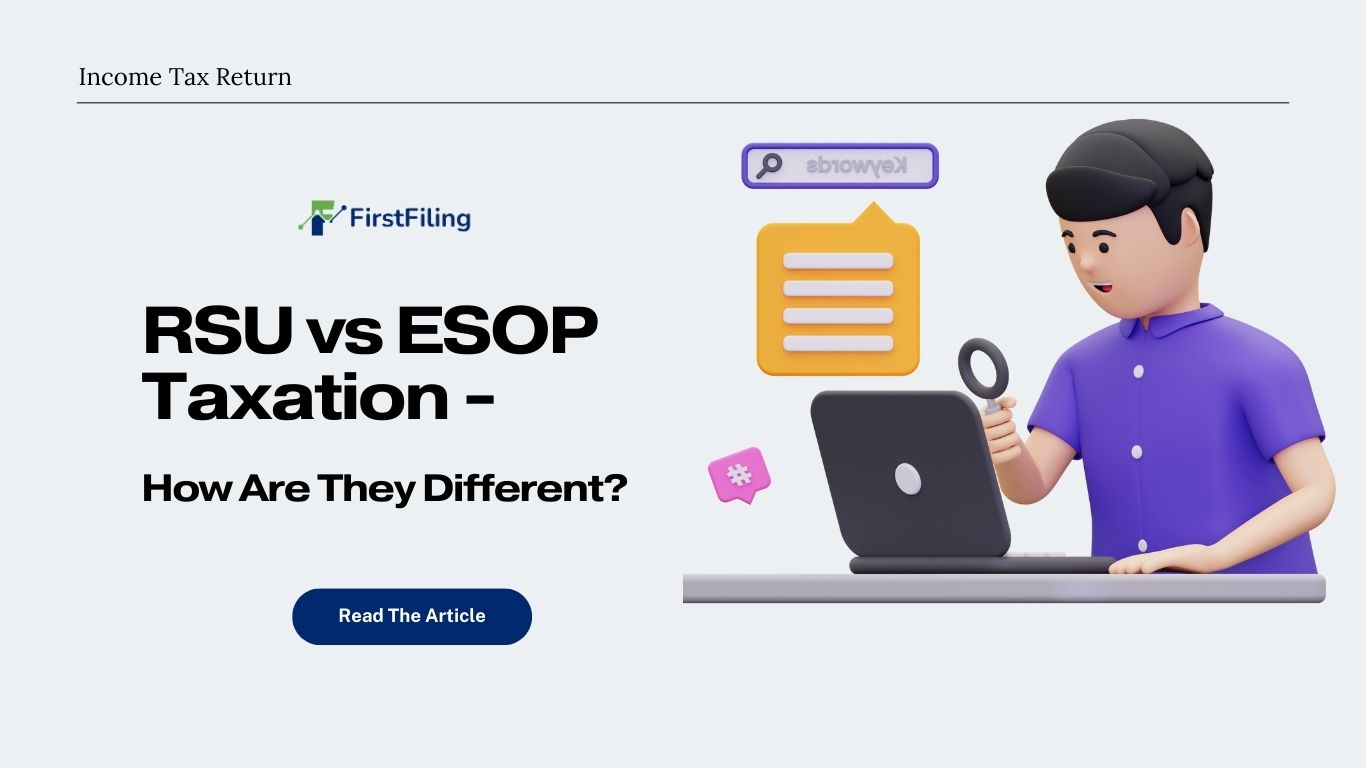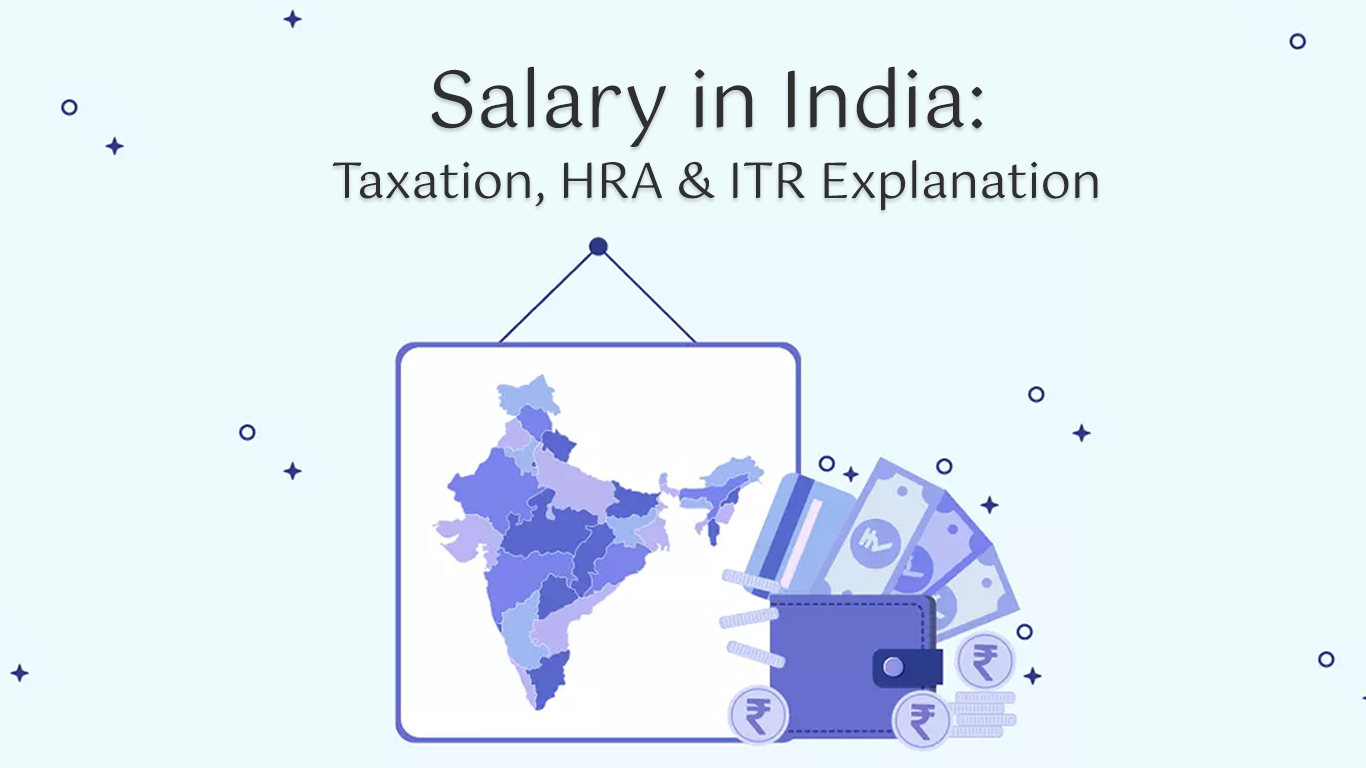
RSU vs ESOP Taxation - What are they? How are they taxed?
It is quite common for an employer to grant different benefits to their employees to keep them motivated and to attract new talent in the organization.
Earlier organizations used to provide benefits to their employees with their basic pay, special allowance, EPF contribution, and gratuity. Nowadays, RSUs and ESOPs are strategically integrated into the CTC to attract and retain employees, particularly in the case of startups.
Sometimes, these benefits can be in the form of company shares. Shares can be granted to the employees in the form of RSU or ESOP.
In this article, I will help you to get a better understanding of RSUs & ESOPs, their taxation, and a guide to help you choose between the two!
Employee Stock Option Plan (ESOP)
An Employee Stock Option Plan (ESOP) is a company's way of rewarding its employees.
ESOP or Employee stock options plan is a benefit that provides employees the option to purchase shares of your company but with the obligation to buy it at a predetermined price known as strike price.
If you are an employee with an ESOP, then you have the right to buy company shares on a future date at a predetermined price.
So, an employer does not transfer the ESOP to the employee immediately after granting it. Instead, they transfer the shares to a trust. It remains with the trust for a certain time, called the vesting period. Once the vesting period is over on the vesting date, the employee can choose to exercise his/her right to buy the shares.
So, when it comes to ESOPs, the future market price of a stock doesn’t matter and you will always have the option to purchase the stock at the predetermined price. But, if the current market price is lower than the predetermined price, then you can choose to not exercise the stock option.
Understanding ESOP with an Example
Suppose that you join a startup on the 1st of January, 2024, and receive 400 ESOPs with a 3-year vesting period and the vesting price is set at ₹300, the vesting date will be the 1st of January, 2027.
So, on 1st January 2027, you will have the option to purchase 400 stocks of the company for ₹300 each.
If the stock price has increased to ₹700 on 1st January 2027, then you can exercise the option made available to you and purchase 400 stocks for ₹300 each, thus making a profit of ₹400 on each stock. In total, you’ll make a profit of ₹1,60,000 just by exercising your option to purchase at the vesting price. In this case, since you have held shares for over 24 months, they will be treated as capital gains for the purposes of taxation. So, if the company is listed on the stock exchange, the taxation rate would be 10% and if the company is not listed on the stock exchange, the taxation rate would be 20%.
Now, if the value of the stock instead reduces from ₹300 to ₹200 by 1st January 2027, you do not necessarily have to exercise your option to purchase stock for ₹300 per stock as doing so will result in a loss. Instead, you can wait for the prices to rise again and then exercise your option to purchase for a potential profit.
Restricted Stock Units (RSU)
Restricted Stock Units or RSUs are another kind of incentive an employer can offer to their employees. Under RSUs, the employer makes the promise of granting employees a predetermined number of shares at the end of the vesting period for free, provided certain conditions are met.
Just because the employer grants them for free doesn’t mean they are free from restrictions. RSUs come with the following restrictions.
- Time-based restrictions: RSUs with time-based restrictions can only be sold once the employee completes a specified period of employment with the employer. So, if you resign during the vesting period, your employer can revoke the RSU.
- Milestone-based restrictions: For RSUs with performance-based restrictions, the employee can only exercise their ownership of the shares once they achieve a predetermined milestone.
- Composite restrictions: RSUs with composite restrictions have a combination of both time-based and mile-based restrictions. The employee must complete a specified period of employment and also achieve a preset milestone to secure ownership of these shares.
Understanding RSU with an Example
Suppose you are an employee of a listed company that has promised to grant you their 1,000 shares as RSU. These are time-restricted RSUs and will start vesting after the completion of 1 year. From the 2nd year onwards, you will receive 250 shares every year.
Such an arrangement to vest 250 shares every year is called a vesting schedule If you quit this company before the vesting period ends, you won't receive any shares.
Since it is a listed company and the shares will start vesting after the completion of 1 year, they will be treated as long-term capital gains taxable at the rate of 10%
The Taxation of ESOP and RSU
ESOPs and RSUs are taxable as perquisites at the time when the employee receives the shares. ESOPs are taxed when the employee exercises the option and RSUs are taxed when the employee receives them.
The employee has to pay TDS on the shares when he/she receives them. The value of perquisite is ascertained by the fair market value reduced by the price paid to get the shares.
So, for RSUs, the fair market value will be the value of perquisites since the employee receives them for free.
Please note that when the shares received through ESOPs or RSUs are sold, they are taxable as per taxation rules on capital gains.
Important points to note:
- If the shares are of a company listed on the Indian Stock Exchange, and the shares are held for less than 12 months, then they’ll be treated as short-term capital gains, taxable at the rate of 15%.
- If the shares are of a company listed on the Indian Stock Exchange, and the shares are held for more than 12 months, then they’ll be treated as long-term capital gains, taxable at the rate of 10%.
- If the shares are of a company not listed on the Indian Stock Exchange, and the shares are held for less than 24 months, then they’ll be treated as short-term capital gains and taxable as per the slab rate of the employee.
- If the shares are of a company not listed on the Indian Stock Exchange, and the shares are held for more than 24 months, then they’ll be treated as long-term capital gains and taxable at the rate of 20%.
ESOPs vs RSUs - Which one is right for you?
I hope you now understand the meaning as well as the differences between RSUs and ESOPs. Both are incentives that a company may give to its employees, and both promise to grant shareholding rights at a future date.
Get a deeper insight into ESOPs vs RSUs
The major difference that sets them apart is their cost. To exercise their right on their ESOP, an employee has to pay money from their pocket but that is not the case with RSUs. So, ESOPs always carry a risk of loss on investment for employees. On the other hand, RSUs carry no such risk and they only lose their value if the company goes out of business.
So, RSUs are generally a safer investment option than ESOPs, in most cases. The one major benefit of ESOPs is that the employee buys them at a lower price than their market price. So, if this price is higher on the exercise date, then they can earn a good profit.
All things considered, one final thing to remember is that employers rarely offer both RSUs and ESOPs. In most circumstances, as an employee, you will likely not get the choice to pick between the two since both ESOPs and RSUs are incentives for employees to help boost their morale.
Conclusion
Restricted Stock Units (RSUs) and Employee Stock Ownership Plans (ESOPs) serve different purposes for employee compensation. However, both RSU and ESOP serve as an effective employee retention program. Beyond providing financial rewards, these stock options also foster a sense of commitment among employees toward the organization’s success.
If you need any professional tax-saving advice on capital gains from ESOPs and RSUs, you can reach out to us. Our team of Chartered Accountants is here to help you with the planning for tax liabilities in advance to avoid any last-minute surprises and ensure compliance with tax regulations.
Our Recent Blogs
- Tips for Managing Foreign Income
- Foreign Income and Tax for Frequent Flyers
- Who Should File Income Tax Return?
Frequently Asked Questions (FAQ)
In the case of an ESOP, employees can purchase shares later at a fixed price, while in the case of an RSU, they can access shares for free with certain conditions. Employees have to pay for ESOPs, while RSUs are free of charge. Taxation is different for both RSUs and ESOPs. Generally, RSUs are considered a safer investment option compared with ESOPs.
The major difference between RSU and ESOP is that RSUs provide shares at no cost to employees under specific terms, but ESOPs allow employees to purchase shares at a set price at a later date.
Employee will get a dividend under ESOP i.e. Employee Stock Option Plan
Employee Stock Option Plans are taxed when exercising the option on the other hand, Restricted Stock Units are taxed when received.
Employee stock option plans allow for both cash and stock settlements, whereas restricted stock units can only be settled in stock.

.jpg)
.jpg)


.jpg)